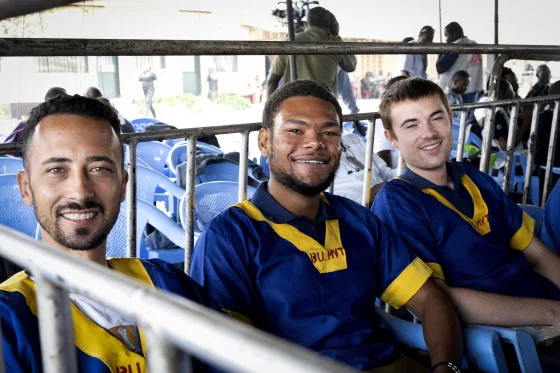U.S. authorities have taken custody of three Americans sentenced to death in the Democratic Republic of Congo (DRC) for their involvement in a failed coup against President Felix Tshisekedi’s government. A military tribunal convicted them in September 2024 of plotting an attack on the presidential palace in Kinshasa, leading to their repatriation.
Marcel Malanga, 21, Tyler Thompson Jr., 21, and Benjamin Reuben Zalman-Polun, 36, participated in the May 2024 attack that resulted in violence and the death of Christian Malanga, the suspected leader of the coup. U.S. officials confirmed that they transferred these individuals to American custody in collaboration with the U.S. embassy in Kinshasa.
Who Are the Americans Involved?
Marcel Malanga, the son of opposition figure Christian Malanga, was among the convicted. According to Congolese authorities, his father coerced him into participating in the plot. His father later died during the attack while resisting arrest.
Tyler Thompson Jr., also 21, had flown to Africa from Utah, believing he was going on a vacation. Benjamin Zalman-Polun, 36, had connections to Christian Malanga through a gold mining company. All three were convicted of criminal conspiracy, terrorism, and other charges, which they denied.
State Department Response
The U.S. State Department expressed its condemnation of the May 19th armed attack while calling for humane treatment and fair legal proceedings for the Americans. Spokesperson Tammy Bruce said, “We also strongly condemn the armed attacks of May 19th and support the DRC authorities in holding those responsible appropriately accountable. At the same time, we seek consistent, compassionate, humane treatment and a fair legal process on behalf of those U.S. citizens.”
The timing of the repatriation coincides with ongoing diplomatic efforts between the DRC and the U.S. The Congolese government has been negotiating with the U.S. for a minerals deal, offering security support in exchange for U.S. assistance in the fight against rebel groups in the eastern DRC. Since January, the DRC’s military has struggled to contain the M23 rebel group.
Other Convicts and Legal Uncertainty
Jean-Jacques Wondo, a dual Congolese-Belgian citizen, received a death sentence for his role in the failed coup attempt. He transferred to Belgium in February because of health concerns. It is unclear whether other foreign nationals involved—a British, Belgian, and Canadian national—will receive commuted sentences or repatriation.
The authorities charged the accused with various offences, including criminal conspiracy and terrorism, after they led the attack on the presidential palace and the home of a close ally of President Tshisekedi. During the attack, assailants killed Christian Malanga, a U.S. national of Congolese origin, along with five others.
While the repatriation of the Americans marks a significant diplomatic move, legal experts have pointed out that it’s unlikely the U.S. will release them or reduce their sentences. According to the Associated Press, the U.S. government is expected to maintain its position on upholding the convictions and serving out their sentences.
DRC Seeks U.S. Security Support
The repatriation comes amid growing instability in the DRC, where the government is seeking U.S. protection and support. The country has been battling rebels, particularly the M23 group, which has made significant territorial gains in the eastern regions. The DRC, rich in valuable mineral resources, is in discussions with the U.S. about a deal that would see the country exchange access to minerals for security assistance in curbing the insurgency.
With the region in turmoil, the DRC is under increasing pressure to secure its borders and regain control of territories lost to rebel groups. The outcome of these diplomatic negotiations could have broader implications for both U.S.-DRC relations and the stability of the region.



